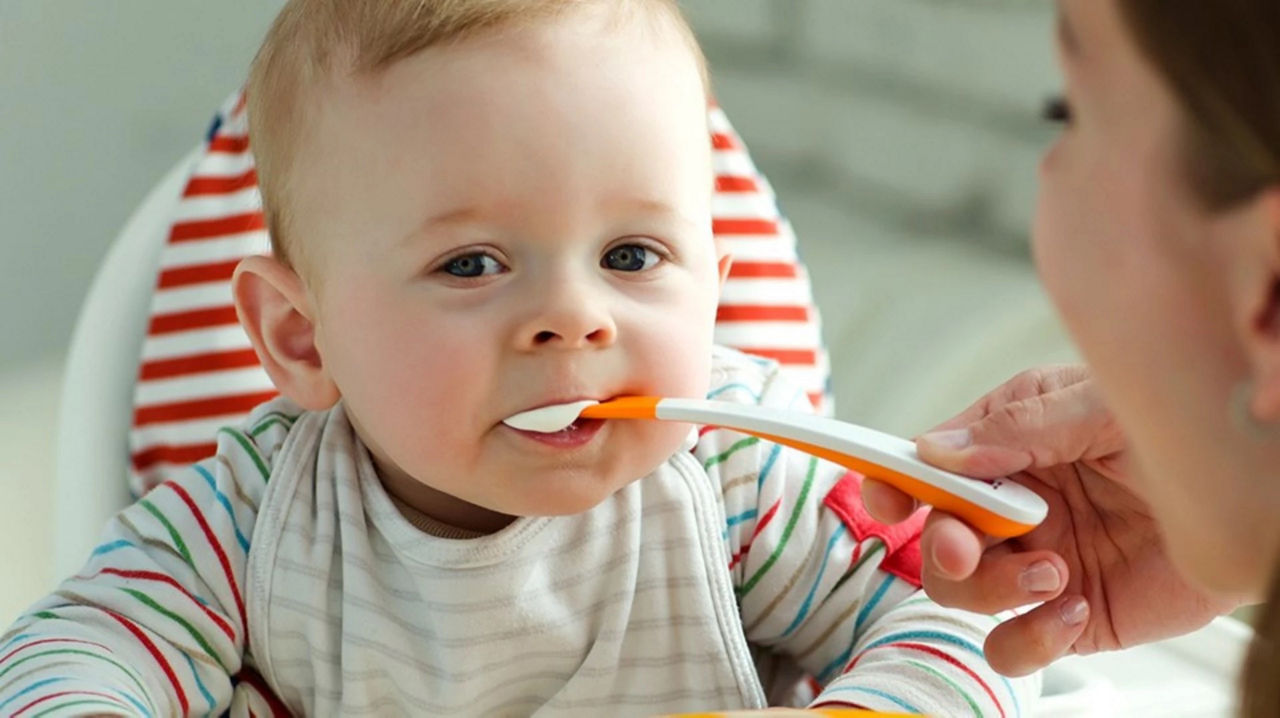While it’s relatively uncommon, babies can be lactose intolerant. Read on to find out more about how to spot the symptoms and what it means for your baby’s diet, as well as their future health and development.
Lactose intolerance in babies

What is lactose intolerance?
Lactose is a sugar naturally found in milk and most other dairy products. In order to break it down, so that it’s easier to digest, the body uses lactase, a digestive enzyme produced in the gut1. An intolerance occurs when the body is unable to produce enough lactase to digest the lactose.
Although the symptoms can be very similar, it’s important to remember that lactose intolerance is not the same as having a milk allergy. In the case of a milk allergy, the immune system is involved, whereas with an intolerance it isn’t.
What are the causes of lactose intolerance?
Only 1 in 50 people of European descent have an intolerance to lactose2. In the UK, it’s more common in people of Asian or African-Caribbean origin3.
There are three main causes of lactose intolerance4:
Primary – this is when the body’s natural lactase production decreases by around 10-30%. This could be as a result of age, or in response to reducing the amount of dairy products that you eat. A primary lactose intolerance doesn’t usually occur before adulthood, and in most cases is associated with cultural groups where dairy products are not a regular part of the adult diet5.
Secondary – this type of intolerance is temporary. It occurs as the result of gut damage, caused by a stomach bug or infection, undiagnosed coeliac disease, or a long course of antibiotics, for example.
Congenital – an extremely rare, genetic form of the lactose intolerance, where babies are born without, or with very low amounts of lactase.
Lactose intolerance may also occur in babies who are born prematurely. This is because their small intestine is not developed enough at birth, and things usually improve as babies get older.
Symptoms of lactose intolerance in babies
The symptoms of lactose intolerance can be similar to those of other conditions, meaning that it’s sometimes hard to identify. However, common symptoms include6:
- Tummy pain and rumbling
- Diarrhoea
- Bloated tummy
- Excessive wind
- Vomiting
These symptoms usually occur within 1–3 hours after the food containing lactose has been eaten7.
What to expect from your lactose intolerant baby’s poop
Loose, watery stools - diarrhoea, are common in babies with lactose intolerance. But loose poos can mean other things, too. So if your baby starts having runnier poo than usual, this doesn’t necessarily mean that they're lactose intolerant.
Remember that it’s not unusual for newborn babies to have the odd runny poo. Every baby is different when it comes to their pooing habits, both in terms of frequency and consistency, not to mention smell. Once you get to know their particular toilet habits, you’ll know what’s normal, and what’s not so normal, for your baby.
What to do if your baby is lactose intolerant
If you think your baby is having digestive trouble, you should visit your GP who can help with a diagnosis. It might be that your baby is referred to a paediatric dietician for more expert care.
If your baby is less than a year old, why not try our Baby Symptom Checker? It includes lots of helpful tips, and you’ll be able to print a symptom summary to show your GP.
When lactose intolerance is suspected, you may be advised to eliminate lactose from your baby’s diet. You should only do this under the guidance of a healthcare professional, who’ll also provide advice around how to ensure that your baby still gets all the nutrients they need for healthy growth and development. Calcium is one nutrient requiring special attention. That's because the body usually gets it from foods contacting lactose. If there’s insufficient calcium in the diet, this can affect normal bone development8.
If you’re breastfeeding, you should continue doing so, and your baby may need lactase drops to digest the lactose in your breast milk. Usually, the enzyme drops are mixed with a small amount of expressed breast milk in a sterile container, which you can then give to your baby from a spoon just before their feed.
The amount of lactose in your own diet isn’t related to your baby’s intolerance, so eliminating lactose from your diet won’t make a difference here. If you think your baby may be reacting to the lactose in your breast milk, the best thing to do is seek advice and guidance from your GP.
If your baby is formula fed, your GP or paediatric dietician may recommend a lactose-reduced or lactose-free formula milk for your baby.
As long as a lactose intolerance is managed and your baby is monitored, it won’t affect their development. Identifying lactose intolerance early means that your baby will feel well again, and get the nutrients they need for this stage of their development, and their future growth.
Foods containing lactose and their alternatives
- Glass of milk (100ml) - 4.6g lactose
- Yogurt whole milk (100g) - 4.7g lactose
- Cheddar cheese (100g) - 0.1g lactose
- Cottage cheese (100g) - 3.1g lactose
- Milk chocolate bar (100g) - 9.2g lactose
- Rice pudding (100g) - 3.9g lactose
| Food Type | Foods containing lactose | Low-lactose alternatives |
|---|---|---|
| Milk | Milk solids, Condensed milk, Modified milk, Evaporated milk, Skimmed milk powder, Buttermilk | Lactose-reduced and lactose-free formulas Rice, oat, almond, hazelnut, coconut, quinoa and potato milks (Important note: only formula milk should be used for babies under one year. Children under 5 years old shouldn't have rice drinks as they may contain too much arsenic.) |
| Fat | Margarine | Butter, clarified butter or ghee, Dairy-free spread, Soya spread, Vegetable oils |
| Cheese | Cheese, Quark | Low lactose*: Edam, Gouda, Brie, Cheddar, Camembert, Blue cheese Lactose-free: Soya cheese, rice cheese, almond cheese, cashew cheese (*Important note: babies younger than 6 months shouldn't eat soft or unpasteurised cheeses) |
| Yoghurt | Dairy yoghurt | Low-lactose: Cows' milk yogurt Lactose-free: Soya, almond, coconut yogurt |
| Cream | Cream, Artificial cream, ice cream | Soya cream, Oat cream |
| Food ingredients | Lactose Lactoglobulin, Curd, Whey powder |
Other types of food may contain lactose, too. If your baby has lactose intolerance, be sure to check the ingredient list of any of the foods below to establish whether they’re suitable for your baby’s diet1:
- Processed meats and foods, e.g. ham
- Bread and bread products
- Breakfast cereals
- Cakes
- Biscuits
Will my baby grow out of lactose intolerance?
Depending on the cause, your baby may fully recover from a lactose intolerance, or be able to tolerate more lactose in their diet in the future. For example, symptoms of secondary lactose intolerance normally disappear within two to four weeks, when the intestinal wall has recovered from the gut damage causing it. However, for some people, lactose intolerance lasts for life.
Your GP or paediatric dietician may want to try to reintroduce lactose to your baby’s diet at some point to test your baby’s reaction and see if there’s been any change. So keep in touch with your health professional and keep them in the loop about how your baby is getting on.
Next steps
- If you suspect your baby has lactose intolerance, speak to your GP or health visitor. They will guide you in the next steps of identifying the issue and getting your baby back to full health.
- You can also enter your baby's symptoms into our Baby Symptom Checker, which will give you practical advice and a handy symptom summary to discuss with your GP.
related articles
Read more

Get in touch with our Careline experts
Our nutritionists and feeding advisors are always on hand to talk about feeding your baby. So if you have a question, just get in touch
- NHS UK. Lactose intolerance [Online]. 2019. Available at: www.nhs.uk/conditions/Lactose-intolerance/Pages/Introduction.aspx [Accessed April 2021]
- The Week. Lactose intolerant? Why most of us can’t digest milk. [Online] 2018. Available at: https://www.theweek.co.uk/64017/lactose-intolerant-why-most-of-us-can-t-digest-milk#:~:text=An%20open%20mind%20on%20the%20issues%20that%20matter&text=Only%20one%20person%20in%2050,from%20China%20have%20the%20condition. [Accessed April 2021]
- NHS UK. Lactose intolerance [Online]. 2019. Available at: www.nhs.uk/conditions/Lactose-intolerance/Pages/Introduction.aspx [Accessed April 2021]
- EFSA. Scientific opinion on lactose thresholds in lactose intolerance and galactosaemia [Online]. 2010. Available at: www.efsa.europa.eu/en/efsajournal/pub/1777 EFSA Journal 8(9):1777 [Accessed April 2021]
- British Nutrition Foundation. Lactose intolerance [Online] 2021. Available at: https://www.nutrition.org.uk/nutritionscience/allergy/lactose-intolerance.html?start=1 [Accessed April 2021]
- NHS UK. What should I do if I think my baby is allergic or intolerant to cows’ milk? [Online]. 2019. Available at https://www.nhs.uk/common-health-questions/childrens-health/what-should-i-do-if-i-think-my-baby-is-allergic-or-intolerant-to-cows-milk/ [Accessed April 2021]
- Dunne. T., Farrell. P. & Kelly. V. (2008). Feed Your Child Well. A & A Farmer
- Dunne. T., Farrell. P. & Kelly. V. (2008). Feed Your Child Well. A & A Farmer
- Dunne. T., Farrell. P. & Kelly. V. (2008). Feed Your Child Well. A & A Farmer
- British Nutrition Foundation. Lactose intolerance [Online] 2021. Available at: https://www.nutrition.org.uk/nutritionscience/allergy/lactose-intolerance.html?start=1 [Accessed April 2021]
Last reviewed: 09th June 2021
Reviewed by Oriana Hernandez Carrion



